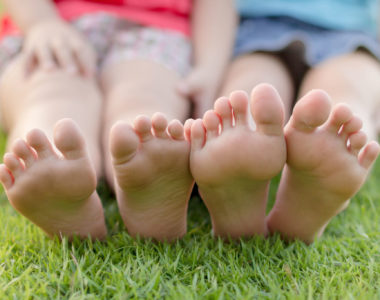 A new study published in Frontiers in Pediatrics found that children who are habitually barefoot are more likely to have better motor skills than children who regularly wear shoes.
A new study published in Frontiers in Pediatrics found that children who are habitually barefoot are more likely to have better motor skills than children who regularly wear shoes.
For their study, researchers recruited 810 school children from 22 primary and secondary schools from either Northern Germany or Western South Africa. Researchers believed that being habitually barefoot or habitually shod affected foot and gait biomechanics, but they wanted to learn more about the specific changes. Each child was put through a set of tests to measure certain movements and abilities, and at the end of the study, researchers found:
- Wearing or not wearing shoes regularly impacts things like gait biomechanics, balance and jumping ability.
- The habitually barefoot students showed better jumping and balance skills compared to the children that regularly wear shoes.
- Children who regularly wore shoes had better sprint speeds, although researchers are quick to question the strength of that finding because of the track locations. The shod children ran on an indoor track, while the barefoot kids ran on a dirt road, and regardless of footwear, you can expect a person to run better on the track compared to the dirt.
Putting The Results To Use
Now that we know that motor skills can be improved if kids regularly go barefoot, what can we do with the results? Obviously we can’t just send our kids out the door for the day without shoes, but there are ways that we can incorporate barefoot activities into their daily routine. According to Professor Astrid Zech, who led the study, parents and physical education teachers should take note of the study.
“Physical education classes, exercise and sport programs, and reactional activities that aim to improve basic motor skills could benefit from including barefoot activities. Parents could also encourage regular barefoot time at home.”
When it comes down to it, it might be a good idea to let your children go barefoot in appropriate settings, like in a grass backyard or while they are roaming around the house. Doing so can help them work different muscles groups and inherently improve things like balance and coordination. Shoes obviously provide a layer of protection from certain elements, but they may be hurting us in other ways, so make barefoot time a priority. After all, we didn’t come into this world with shoes – our feet are up for the task of thriving without them.